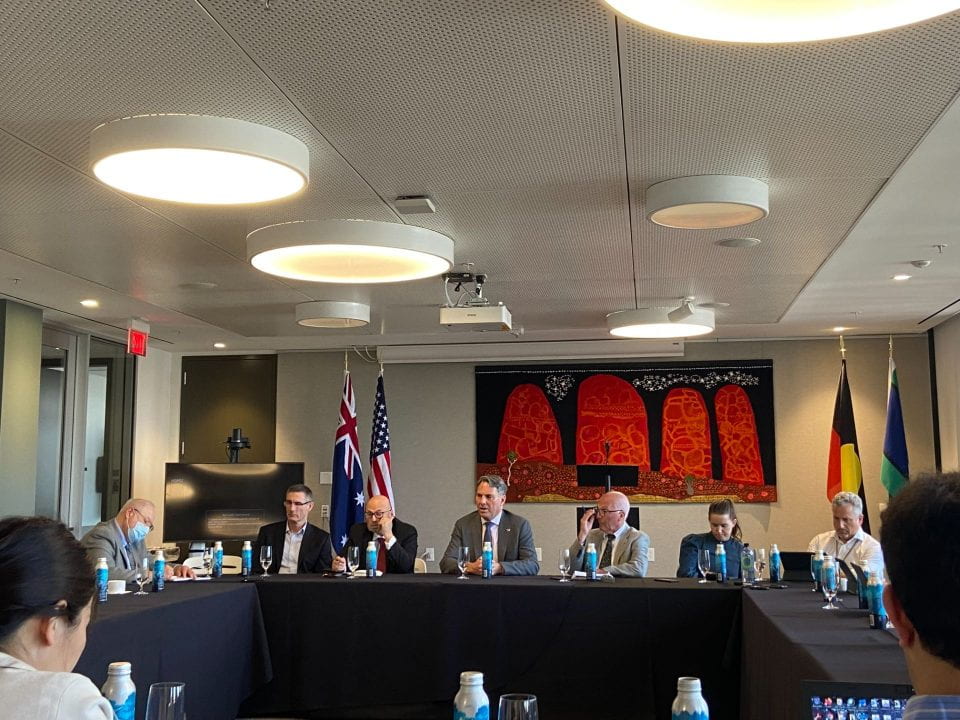By: Heather Mongilio of USNI News
WASHINGTON, D.C. — The Australian government is set to announce the design for its first nuclear submarine in the first quarter of 2023, its deputy prime minister and defense minister said Thursday.
Canberra is also looking to see how it can speed up the process for getting the chosen submarine built and deployed, Deputy Prime Minister Richard Marles said on Thursday.
“What I’ve sought is to really look at every way in which we can speed that delivery or the process of having our first nuclear submarine in the water,” Marles said. “And so it will not just be about announcing which submarine, we will be talking about when that submarine will be in the water.”
As part of the process to decide the submarine and timeline, the Australian government also will address the gap that will potentially emerge in getting the Royal Australian Navy’s capability from what it can do with their current Collins-class submarines to the chosen submarine, he said speaking during a Defense Writers Group roundtable
The bulk of the Australia-United Kingdom-United States partnership (AUKUS) focuses on Australia getting a nuclear-powered submarine, Marles said. However, it also allows for other collaboration on technology, like artificial intelligence.
“This is a really important issue for Australia,” Marles said. “It’s the most significant platform that we have, which builds our strategic space. And I mean that in terms of the whole, the strategic space in which we operate in the world diplomatically, in terms of trade, this is a fundamentally important national mission.”
Part of closing the gap will be sustaining the current line of Collins-class submarines the Australians currently use.
“There is already a commitment to extend the life of Collins,” Marles said. “That will be a really important part of the program. But I don’t think that’s the totality of the answer. And there are a range of other options that we’re considering about how we can do this. But this is a really important piece of the puzzle.”
While the Australians figure out how to extend Collins’ lifespan, it also needs to address the human aspect, he said. The country needs to grow to have enough people to sustain its submarine program.
Another potential barrier to AUKUS is the export policies held by each country. In order for AUKUS to be successful, the three countries need to have a seamless industrial base, Marles said.
“And it would be fair to say that the achievements, the aspirations of AUKUS are going to be tied up significantly with our success or not in being able to break down those barriers,” he said. “And those barriers, yes, some of them exist in the United States system, but it’s not exclusive to the US, like we have [them] too and as does the UK.”
That is understood by the governments of both the United States and Australia, Marles said.
But that needs to make its way from the highest levels of government downward, he said.
Marles visit to the United States was also part of several meetings he had with countries that are part of the Quad, a loose partnership of like-minded countries that support the rules-based order in place since World War II in the Indo-Pacific region, Marles said.
Japan and India are the two other members of the partnership. Marles has had a bilateral visit with each country in the Quad, he said.
This was the first visit to America that Marles has done on behalf of Australia’s new government.
“It is and has been since the second world war, the most important bilateral relationship that we have,” Marles said. “The alliance is completely central to our national security and the way we see the world.”
The agreement between Australia, U.K. and U.S. are in the midst of an 18-month research phase to create a nuclear-powered attack boat for the Royal Australian Navy. The move canceled a deal with France for conventionally powered submarines.
France is an important ally for Australia, Marles said, although he said he would not rehash the decision to cancel the deal and the fallout.
“It has been very important we feel to reach a settlement with France, so that we can put a line underneath that episode and move forward. […] Because France matters, France matters to Australia,” he said.
Others:
https://www.afcea.org/signal-media/australia-seeks-strong-technology-alliance


